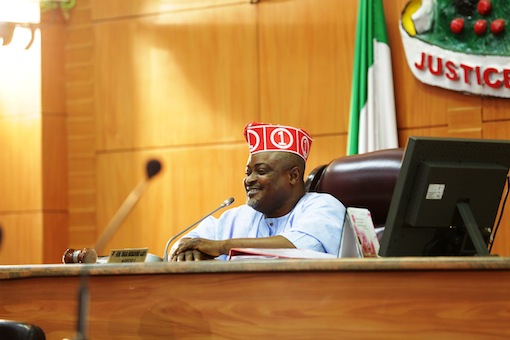
Lagos State House of Assembly (LSHA) has asked the 10th National Assembly to commence the process of altering the 1999 Constitution (as amended) to allow for the establishment of state police. At its first plenary session, Speaker of the LSHA, Mudashiru Obasa, moved the motion for such constitutional amendment and it was overwhelmingly supported by members of the 10th state assembly. Obasa said state police would help stem the high level of insecurity across the country.
We support the call by the Assembly, and urge other states to join in the demand for constitutional amendment to allow for state and other levels of policing. We hope lessons have been learnt from the opportunities missed by the previous assemblies at the federal and state levels. Without doubt, despite the best efforts of the federal police, security situation in the country has continued to deteriorate and unless critical steps are taken, it will get worse.
Currently, according to available data, Nigeria has about 371,800 police officers for a population of over 200 million. While the United Nations recommends one police for every 450 citizens, Nigeria has an estimate of one police for every 540 citizens. To meet the recommended standard, a police report in 2017 said the country needs to recruit 30,000 police personnel annually for the next five years. Apart from poor numbers, Nigeria also faces the challenge of poor policing by personnel posted to strange environments.
To stem that challenge, the country initiated the community policing model. Last year, speaking at a capacity building workshop for stakeholders, the immediate past Inspector-General of Police (IGP), Usman Alkali Baba, said: “community policing is undoubtedly a way to go in a drive to effectively address the complex and dynamic challenges of crimes and mitigate the challenges of internal security realities.” That police initiative was launched in 2017, with the intention to recruit 10,000 police constables at a budget of N13 billion for the programme.
While there are patches of success, the scheme has not drilled any hole in the massive crust of insecurity weighing down on states across the country. Kidnapping for ransom, farmers-herders clashes, banditry, insurrection, armed robbery and sundry criminality are upending the nation’s wellbeing, and so, there is urgent need for a review of the nation’s security architecture, without further delay. With a large chunk of the police guiding very important personalities (VIPs), what is left of the 371,800 is not enough to effectively police the 923,768 sq. km. of Nigeria, with all its complexities.
At a current estimate of over 200 million, Nigeria’s population is projected to grow to 400 million people by 2050, and unless efficient and effective policing is put in place, the present security nightmare would become a child’s play in the nearest future. For 2023, the budget proposal for the Ministry of Police Affairs and agencies under it was N871 billion, and the former minister, Alhaji Muhammadu Maigari, at the budget defence lamented that it was grossly inadequate.
No doubt, funding remains a major challenge for the police, necessitating the intervention of state governments. Over the years, the Lagos State Security Trust Fund, established in 2007, has helped to augment funding of security agencies in the state. Nearly all other states have had to buy equipment for police in their state, as the Federal Government is unable to provide the needed funding. Unfortunately, despite the massive state funding, a governor has no operational control over the police, and that affects efficiency.
Considering the challenges which have made policing ineffective across the country, and the urgent need to secure every inch of our land, the 10th National Assembly should heed the call by the LSHA and further amend the 1999 Constitution to allow for state police.
END

Be the first to comment